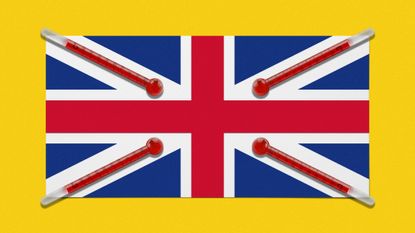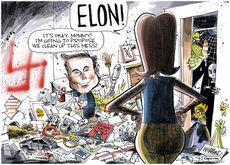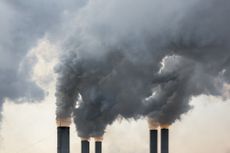Cop28: is the UK serious about tackling climate change?
The UK government has watered down a number of climate policies in recent months

Rishi Sunak is making a "blink-and-you'll-miss-it" whirlwind stop at the Cop28 climate conference in Dubai amid concerns his government has watered down many of the UK's climate policies.
Sunak will be attending the climate conference for just 11 hours, "a flying visit" in comparison to other world leaders, with French president Emmanuel Macron "sticking around for at least 24 hours" and German chancellor Olaf Scholz and Spanish prime minister Pedro Sánchez "expected to make it a two-day stint", said Politico.
Labour leader Keir Starmer, on course to be the UK's next prime minister according to polling, is expected to stay until Saturday. He will meet green investors and world leaders "as he seeks to boost his own climate cred" in preparation for government, said Politico.
Subscribe to The Week
Escape your echo chamber. Get the facts behind the news, plus analysis from multiple perspectives.

Sign up for The Week's Free Newsletters
From our morning news briefing to a weekly Good News Newsletter, get the best of The Week delivered directly to your inbox.
From our morning news briefing to a weekly Good News Newsletter, get the best of The Week delivered directly to your inbox.
What the papers said
Sunak is expected to "reaffirm Britain's commitment to reaching net zero carbon emissions by 2050", said Jim Pickard in the Financial Times. But while he may be "sticking to the headline net-zero target", the government has "watered down" several green policies in recent months, including introducing a five-year delay to the phasing out of new petrol and diesel cars from 2030 to 2035.
And in the King's Speech last month, the government set out controversial new legislation to mandate annual oil and gas licensing rounds in the North Sea.
Ahead of the Dubai summit, Sunak used a speech to stress that he was not “in hock to ideological zealots” over climate change.
He said that while the government's climate targets are "more ambitious than any other major economy", he wanted to ensure "that we get to net zero in a pragmatic and proportionate way that saves working families thousands of pounds".
"When the UK hosted the COP26 climate conference in Glasgow, few could doubt its ambitions on climate leadership," said climate reporter Victoria Seabrook on Sky News. But just two years later, "confidence in that leadership is wavering".
The government's "recent change in rhetoric at home and issuing of new licences for oil and gas projects in the North Sea have not gone down well on the world stage".
"People are noticing that there have been changes [in the UK]," Jennifer Morgan, Germany's climate envoy, told Sky News. "And I hear from some of the most vulnerable countries a sense of worry."
Much of the discussion at the UN climate talks will centre around how to describe the shift away from coal, oil and gas, with the debate largely fixated on whether to phase fossil fuels "out" versus "down", said Politico.
The UK has formally backed the "phaseout of unabated fossil fuels", in line with the EU and other allies. But this position has been called into question after Graham Stuart, energy minister and head of the UK delegation, suggested to a parliamentary committee last month that precise terminology was not a priority.
"Our belief is that we should focus on phasing down, phasing out – whatever it does, as long as it translates into real action – of unabated fossil fuels," Stuart told MPs less than a month before the summit.
On the other side of the political divide, Starmer is likely to spend the summit "stressing the Labour Party’s green credentials", said Pickard in the FT.
He will use the summit to argue that the push to net zero is an "economic opportunity" for workers and businesses, as well as set out ambitions to make the UK "the green finance capital of the world" by requiring financial institutions and FTSE 100 companies to publish their carbon footprint and adopt "credible 1.5C-aligned transition plans".
What next?
It's unclear whether the UK's commitment to "phase out unabated fossil fuels" will "hold until the end of the two-week summit", said Politico's London Playbook.
When questioned over the matter ahead of the summit Sunak reportedly told journalists: "I'm not going to get into a pre-emption of all these negotiations."
Indeed, the UK's use of the word "unabated" gives it "wiggle room" as it "allows for fossil fuels with expensive technology to capture the emissions, but it is still ambitious", said Seabrook on Sky News.
But as climate experts have pointed out, "it is harder to ask countries to ditch fossil fuels that drive climate change if the UK is still issuing licences" for new oil and gas projects.
Laurence Tubiana, architect of the Paris Climate Agreement and now CEO of the European Climate Foundation, told Sky that the UK has shown leadership on climate issues and "its voice counts". But she added: "As with all diplomacy, you have to 'walk the walk' if you want to persuade others."

Continue reading for free
We hope you're enjoying The Week's refreshingly open-minded journalism.
Subscribed to The Week? Register your account with the same email as your subscription.
Sign up to our 10 Things You Need to Know Today newsletter
A free daily digest of the biggest news stories of the day - and the best features from our website
Sorcha Bradley is a writer at The Week and a regular on “The Week Unwrapped” podcast. She worked at The Week magazine for a year and a half before taking up her current role with the digital team, where she mostly covers UK current affairs and politics. Before joining The Week, Sorcha worked at slow-news start-up Tortoise Media. She has also written for Sky News, The Sunday Times, the London Evening Standard and Grazia magazine, among other publications. She has a master’s in newspaper journalism from City, University of London, where she specialised in political journalism.
-
 10 things you need to know today: December 3, 2023
10 things you need to know today: December 3, 2023Daily Briefing Gaza residents flee as Israel continues bombardment, Trump tells supporters to 'guard the vote' in Democratic cities, and more
By Justin Klawans, The Week US Published
-
 5 X-plosive cartoons about Elon Musk
5 X-plosive cartoons about Elon MuskCartoons Artists take on his proposed clean-up of X, his views on advertisers, and more
By The Week US Published
-
 2023: the year of superhero fatigue
2023: the year of superhero fatigueThe Explainer The year may represent the end of an era for Hollywood
By Brendan Morrow, The Week US Published
-
 What's Qatar's role in the Middle East conflict?
What's Qatar's role in the Middle East conflict?Today's Big Question Doha hosts both Hamas and a U.S. military base. That puts it at the center of the conflict in Gaza.
By Joel Mathis, The Week US Published
-
 Should the US put conditions on Israel aid?
Should the US put conditions on Israel aid?Today's Big Question Democrats are divided on the issue
By Joel Mathis, The Week US Published
-
 'This migrant crisis is not unlike problems we've faced before'
'This migrant crisis is not unlike problems we've faced before'Instant Opinion Opinion, comment and editorials of the day
By Harold Maass, The Week US Published
-
 Is Nikki Haley's Koch network endorsement the shake-up the GOP primary has been waiting for?
Is Nikki Haley's Koch network endorsement the shake-up the GOP primary has been waiting for?Today's big question By throwing its weight behind the insurgent former UN ambassador, the conservative PAC hopes to tilt the scales against Trump
By Rafi Schwartz, The Week US Published
-
 'Carbon taxes are all pain with no gain'
'Carbon taxes are all pain with no gain'Instant Opinion Opinion, comment and editorials of the day
By Harold Maass, The Week US Published
-
 Is the Ukraine government and its military on brink of a split?
Is the Ukraine government and its military on brink of a split?Today's Big Question Public spats between President Zelenskyy and his military chief have contributed to declining morale within Ukraine
By Richard Windsor, The Week UK Published
-
 Is Trump's renewed attack on the Affordable Care Act a blessing in disguise for Democrats?
Is Trump's renewed attack on the Affordable Care Act a blessing in disguise for Democrats?Today's Big Question By setting his sights on "Obamacare" this weekend, the Republican presidential front-runner may have accidentally given Biden an early holiday present
By Rafi Schwartz, The Week US Published
-
 Reform UK: will Farage's party decide the next election?
Reform UK: will Farage's party decide the next election?Today's Big Question The right-wing populists are polling at a record 10% – and could split the Tory vote
By Sorcha Bradley, The Week UK Published










